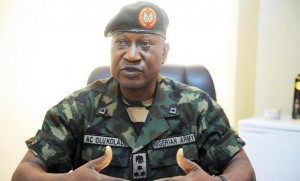U.S. ponders sending troops to Nigeria to help in battling Boko Haram
Scores of U.S. military special forces advisers may be headed to the killing fields in the northeast portion of Nigeria, as well as that African nation’s neighboring countries, to help fight the Islamist insurgency of Boko Haram, according to a Homeland Security News Wire (HSNW) issued on Friday.
The News Wire reported that the Pentagon’s plan to deploy military personnel to Africa is the result of a recent confidential assessment by Brig. Gen. Donald Bolduc, the top U.S. special ops commander for the African continent.
Sadly for some who believe Boko Haram is a threat to U.S. interests, the Nigeria plan has not yet been approved by Commander in Chief Barack Obama nor by the Defense Secretary. However, according to HSNW sources the plan calls for American troops to serve only in an advisory capacity.
HSNW quotes a reliable analyst in its Nigeria report: “Rather than entangle U.S. combat forces on the ground, help build the capacity of regional forces to tackle their countries’ security challenges,” said Jennifer G. Cooke, of the often-quoted Center for Strategic and International Studies (CSIS) in Washington. “Training and advising and perhaps imparting the lessons we learned the hard way is a good thing,” she added.
Nigeria’s next-door neighbor, Cameroon, already boasts a contingent of hundreds of U.S. troops deployed in its country. So far, they have used unmanned aerial vehicles to conduct reconnaissance of Boko Haram’s terrorists which is then turned over to the Nigerian military.
Now General Bolduc is reportedly recommending that the United States sends small units of special ops forces to the city of Maiduguri. An area credited for being the birthplace of Boko Haram and their attacks. Boko Haram today is affiliated with the Islamic State of Iraq and Syria (ISIS).

Last year, four nations neighboring Nigeria threatened they’d ignore the Nigerian government’s sovereignty and leaders’ objections and deploy their own troops into Nigeria to battle the Boko Haram forces.
“The Nigerian military, hollowed out by corruption, could not deal effectively with the Islamist militants, who began to attack targets in Cameroon, Chad, Niger, and Burkina Faso. The effectiveness of the militaries of Nigeria’s neighbor – especially the U.S.-trained and supplied Chadian air force – pushed Boko Haram back, and the militants lost large swaths of territory previously under their control,” the HSNW report states.
When President Muhammadu Buhari replaced Goodluck Jonathan as Nigeria’s leader, he made a show of revamping the entire military by appointing new leadership. He then told that new leadership that he will give them three months to decisively defeat Boko Haram.
“So far, no cigar for the new military brass. Boko Haram didn’t get this powerful overnight and they won’t go away overnight either,” said former military intelligence operative and police counter-terrorism unit member Joseph Lansdowne.
Lansdowne does credit the Nigerian military with weaken Boko Haram and pushing them out of some towns and villages under Islamist rule, but deadly terrorist attacks and suicide bombings are the hallmark of radical Islamist groups.


